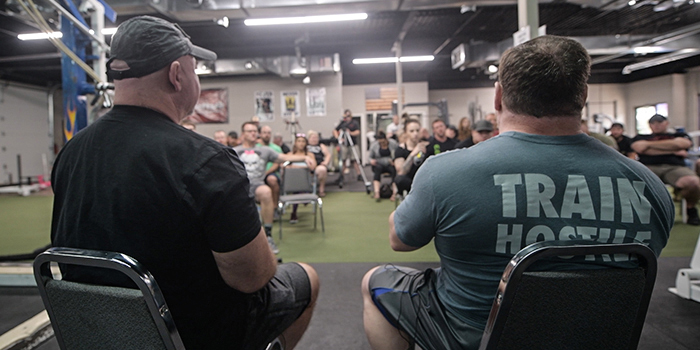
Ed Coan and Dave Tate sit down at Omaha Barbell to share insights from their respective powerlifting journeys with a group of athletes and lifters. Given their experience, both Tate and Coan have had opportunities to cross paths with many legends of the sport over the course of their careers.
WATCH: Ed Coan and Dave Tate Coach the Squat
One such legend is Chuck Vogelpohl, widely known for his extreme intensity and longevity with regard to powerlifting competitions. In this clip, Tate and Coan address the question of what it was like to train with Chuck. In doing so, they help paint a picture not only of who he is as a powerlifter, but also as a person.
Internal and External Intensity
As Tate prepares to respond to the question, he acknowledges that in all his years of conducting seminars, he probably receives more questions about Chuck than anybody else. This is not necessarily surprising to learn, given Chuck’s reputation for unparalleled ferocity and strength. Simply put, he is a force of nature. Tate agrees that Chuck certainly approaches the platform and his training programs with intensity. However, while this kind of intensity can drive a powerlifter’s competitive performance, at times it can also be, as Tate puts it, a curse. In some cases, the hype would even stand to detract from his technique.
In all the meets that I helped him at – man, I was exhausted. Just trying to keep him ‘down’, because he’d get so hyped up that he’d [mess] his squat up, he’d fall over in the bottom, and it’s just like dude, settle down.
Furthermore, Tate notes that although the intensity that Chuck displayed at meets may have seemed extreme to most, that was nothing compared to what was going on inside his head. In fact, Tate admits that he was hardly concerned with the external component – it was the internal intensity that mattered, and that he had to work with Chuck to regulate.
Respect for the Sport
In revealing lesser-known insights about Chuck, Tate wishes that more people appreciated and understood the actual person behind the platform. He says that what most people don’t realize, is that Chuck was always the first person in the gym setting up, cleaning, and preparing everything for the other lifters. Similarly, he was always the last person to leave the gym, meticulously ensuring that weights were put away and everything was in its proper place – ready for the next group of athletes. Given the amount of respect that people have for him as a lifter, many would be surprised to learn that Chuck has that much more respect for the sport itself. It shows in how he takes immense pride in caring for his training environment and for his fellow lifters.
WATCH: Chuck Vogelpohl's 1100-Pound Squat
Laughing, Coan and Tate reflect back 20 years ago when everyone was trying to emulate Chuck with their beanie hats, popped collars, and cocky attitudes. Tate would challenge these imitators, saying that if they really wanted to be like Chuck, then they should be the first person in the gym and the last one out at the end of the day. They should put their weights away, help maintain their training environment, and take responsibility for making sure that other lifters in the gym are getting the coaching that they need. And if they really wanted to be like Chuck, they’d have to be able to do all of that and have the lifting strength to back it up.
It Takes a Village
In referencing Louie Simmons, Tate says that he engrained in them that it’s their responsibility to make everyone else better. Chuck fully takes this teaching to heart, and in doing so has one of the best eyes for dissecting and improving another lifter’s technique. Nevertheless, from a coaching perspective, one person’s opinion is never enough to take a lifter’s performance to the next level. Tate alludes to the fact that it takes a village, and coaches should never let their egos get in the way of that community aspect of the sport.
As coaches, you’ve got to understand that sometimes you don’t know all of the answers. So, it’s okay to have somebody else help. It’s okay to delegate it out because ultimately, it’s your business.
Tate encourages coaches to lean on one another. Bringing in a fresh perspective to a training challenge should not be viewed as a failure – rather, the failure would be refusing to do so. In such a situation, not only would the coach be doing their trainee a disservice, but they might also be denying themselves an opportunity to learn something new as well.









